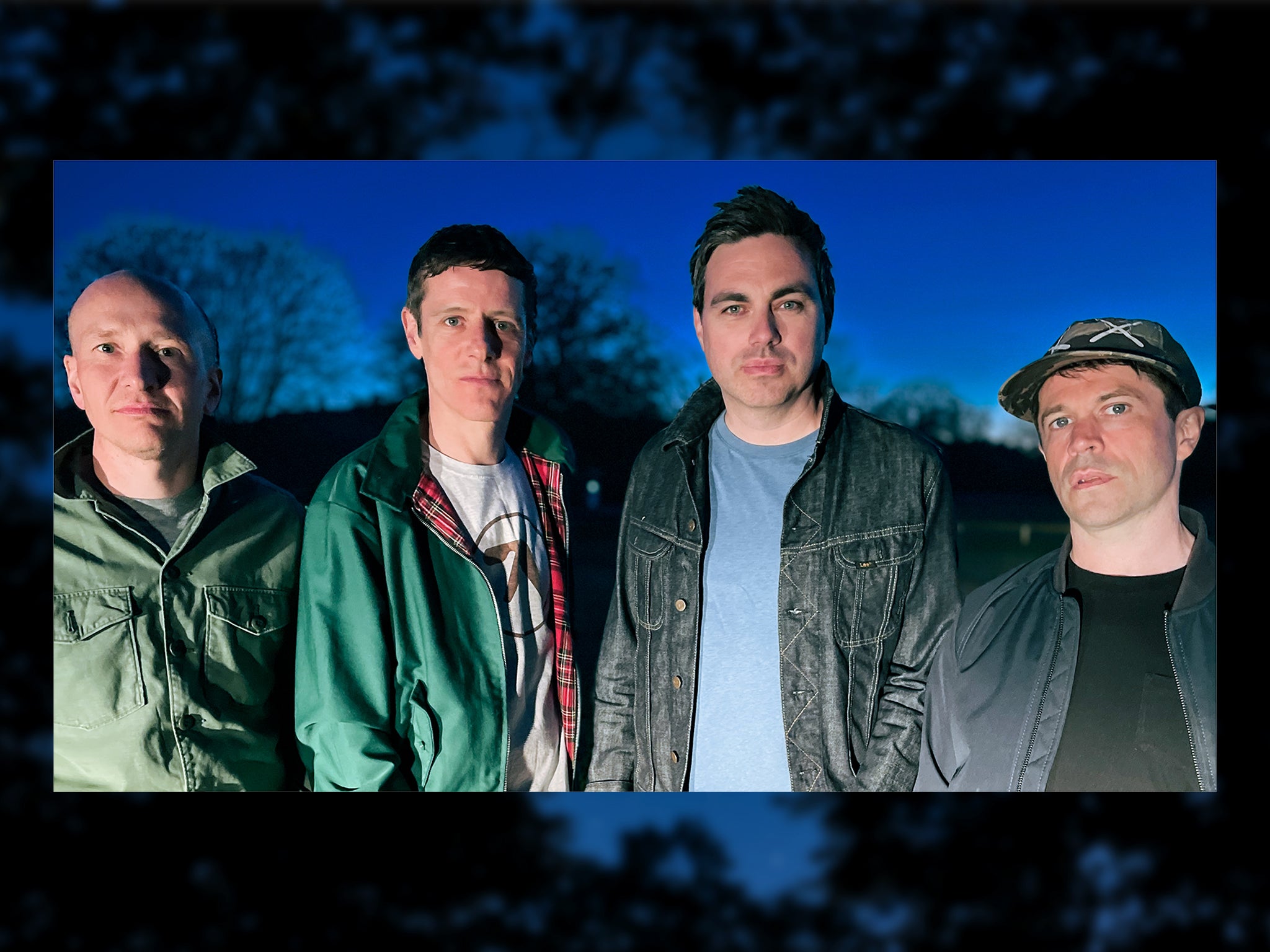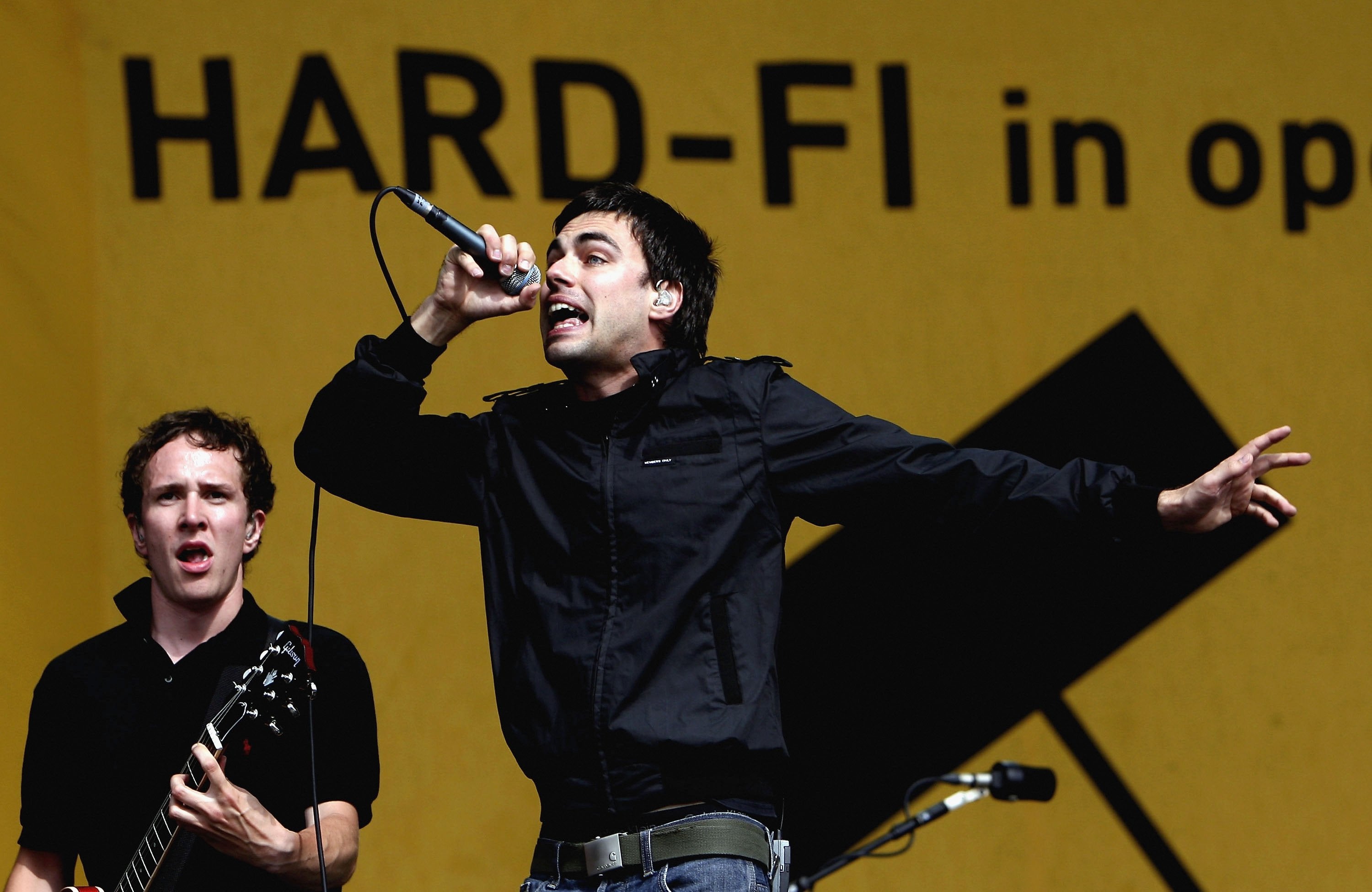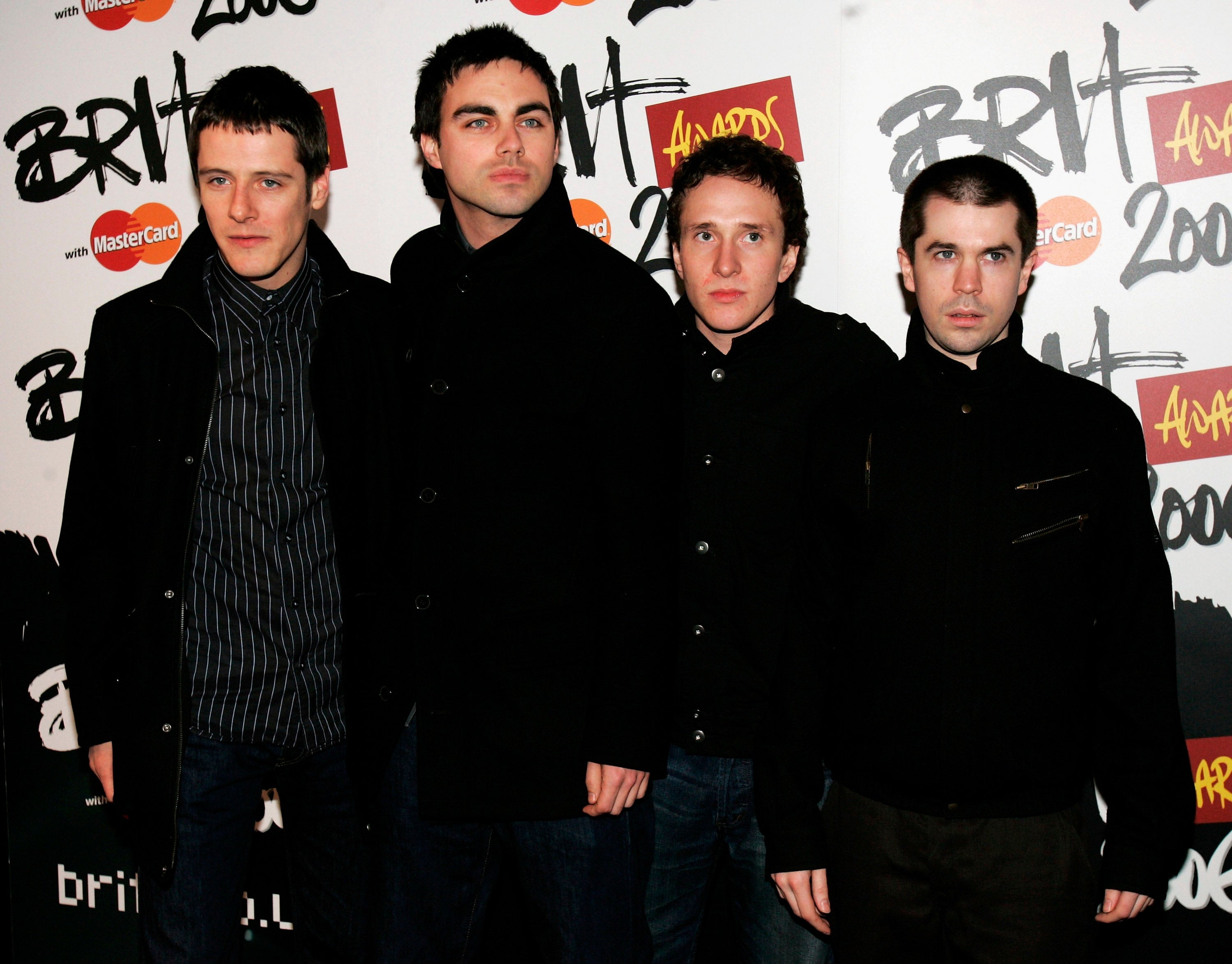Hard-Fi’s Richard Archer: ‘It’s like we went a bit to the left so the right went Nazi Germany’
Seventeen years since the release of Hard-Fi’s debut album ‘Stars of CCTV’, the indie rockers’ reunion shows sold out in 10 minutes. Mark Beaumont talks to singer Richard Archer about politics, private detectives and putting the band back together

Your support helps us to tell the story
From reproductive rights to climate change to Big Tech, The Independent is on the ground when the story is developing. Whether it's investigating the financials of Elon Musk's pro-Trump PAC or producing our latest documentary, 'The A Word', which shines a light on the American women fighting for reproductive rights, we know how important it is to parse out the facts from the messaging.
At such a critical moment in US history, we need reporters on the ground. Your donation allows us to keep sending journalists to speak to both sides of the story.
The Independent is trusted by Americans across the entire political spectrum. And unlike many other quality news outlets, we choose not to lock Americans out of our reporting and analysis with paywalls. We believe quality journalism should be available to everyone, paid for by those who can afford it.
Your support makes all the difference.For a second, it’s like 2005 has barged into the pub demanding respect. Richard Archer, singer with Staines’ indie rock massive Hard-Fi, arrives at a Thames-side Richmond boozer with his bright blue eyes flashing and the jaw-length hair he sported pre-pandemic shorn back to his classic indie bovver-boy cut. He’s as energised as he ever was when leading some of the most raucous gig scenes this writer saw that entire disrespected decade, when entire Academies would be bouncing right back to the (drunk dry) bar to clock-off clubland punk anthems “Hard To Beat” and “Living For The Weekend”. He was champion of the skint but shot-crazed, a roaring mouthpiece for the left-behind street stars of surveillance culture Britain.
The haircut is appropriate: it’s now 17 years since the band’s debut album Stars of CCTV ram-raided the UK charts, but Hard-Fi are undergoing a Semtex blast of popularity. After just four posters appeared on the London Underground bearing their lurid yellow warning sign CCTV camera logo and a date, they sold out a reunion show at London’s Kentish Town Forum in ten minutes and would have played more if the dates had been available.
“You’ve got three years’ worth of people trying to do gigs,” Archer explains. “[Our agent] would be saying ‘I’ve got these dates and five people want those dates’. It’s just madness. A lot of people are saying ‘aren’t you doing any more?’ We physically can’t. And also we wanted to see if anyone would give a s***. You just don’t know. It seems like such a long time ago.”
Indeed, eight years on from Hard-Fi’s last gig, it’s easy to forget what a phenomenon the band were in their mid-noughties heyday. In July 2005, Stars of CCTV – initially recorded for just £300 in a converted minicab office in Staines – entered the charts at No 6, on a six-month journey to the top spot and over 1 million sales. Its exuberant dispatches from the suburban breadline – uncooperative cashpoints (“Cash Machine”), clubland lusts (“Hard to Beat”) and payday blow-outs (“Living for the Weekend”) set to a driving mash-up of melodic gutter rock, Clash dub and disco sweeps – made Hard-Fi the voice of the working-class satellite town outsider, raving weekends away to forget the poverty, the unwanted pregnancies and the friends and family in Feltham Young Offenders Institute (“Feltham is Singing Out”) or on tour in Iraq (“Middle Eastern Holiday”).
As such, they equalled the then-record of five sold-out nights at Brixton (since broken by The xx in 2017), inviting guest performers such as Billy Bragg, Paul Weller and The Clash’s Mick Jones onstage and breaking the venue’s record for the most beer sold in one night. The establishment opened the door a crack to witness the riot. Hard-Fi were narrowly pipped to the 2005 Mercury Prize by Antony and the Johnsons, and even received an invitation to visit 11 Downing Street from Gordon Brown.
“We didn’t go,” Archer says. “We saw when Oasis went to 10 Downing Street and thought, no, we’ll not do that. It just didn’t feel right to go and side with anyone. I sort of wish we’d gone now, it’d be something to talk about.” He pauses, considering Brown’s current standing as one of few adults in the room on Brexit, the cost of living and energy renationalisation. “And actually, look at Gordon Brown now...”
Though 2007’s second album Once Upon a Time in the West also topped the charts, Hard-Fi’s was an unsustainable rise. By 2011’s third album Killer Sounds, Archer admits, “we probably got frustrated with each other. There was a point when it got really difficult towards the end. Everyone lost a bit of love for it, but we always stayed friends. Certainly for Steve [Kemp, drummer] and I, we’d been in bands that hadn’t worked out and we were super focused on ‘we can’t f*** this up’. And I think at some point, that became to the detriment of the project and to us, our mental health, because we should have just enjoyed it. Everything had to be ‘we’ve got to get this right’. Instead of just rolling with it we were worried about everything.”
In the wake of Hard-Fi’s split in 2014, Archer turned to backroom songwriting and production. Kemp, a Crohn’s disease sufferer, studied for a degree in nutrition and became an adviser for others. Guitarist Ross Phillips took to crew work, while for a short period bassist Kai Stephens was employed as a private detective.
“He’s not doing it anymore,” Archer reveals. But wary of blowing his cover, we pause the interview while he writes Stephens a text, asking for permission to open the case files. Permission granted, we set about declassifying the last days of Hard-Fi.
“Actually, towards the end of Hard-Fi he was doing it,” Archer says. “His neighbour was a private detective and he asked Kai if he could help him out. So Kai was tailing people. We booked our tour and it was like an episode of Murder She Wrote. He was telling me he was following someone around Sainsbury’s and this sort of stuff. He ended up having to do some kind of burst in on a hotel room on someone having an affair.” He mimes a “gotcha” photograph. “He is an incredible bloke, he should be a superstar.”

Kai’s day may still come. When the pandemic put paid to Archer’s plans to release an album with his 2020 project OffWorld (the political soul punk outfit he started with Olivier nominee Krysten Cummings), he decided, casually, to play Stars of CCTV acoustically in his kitchen for a lockdown live-stream. The set opened floodgates of fan requests for a reunion, many from people who were too young to see the band in their prime. And in playing the songs today it struck Archer how much more relevant they’ve grown since 2005, over the subsequent years of austerity and rocketing wealth inequality.
“There’s certainly a lot of bands around at the moment like Sleaford Mods, they are resonating, and a lot of punk bands,” Archer says. “I look back now and you go, should I have been complaining? Because look how bad it is now. You’ve got videos emerging of Jacob Rees-Mogg saying, ‘Why should everyone have statutory holiday pay?’ They’ve got no idea about people’s lives. Everything is so expensive, wherever you go. How can that keep going on like that? People going without food for four days and more food banks than ever before...”
For a moment Archer shakes his head, speechless. “The right wing was so shook, they had an existential crisis because of Blair and New Labour and then in the United States because of Barack Obama. It was like, ‘How the f*** can this happen? This is where we go dirty, we go dark, we go hardcore. How dare the country vote Labour for 13 years? We’re going to do everything we can to destroy that legacy, destroy what they’ve done and convince people that that was the wrong way’. They’ve gone so far out the other way. It’s like we went a little bit to the left and the reaction from the right is to go Nazi Germany.”
The right wing was so shook, they had an existential crisis because of Blair and New Labour
Hard-Fi often struggled for the media respect their success deserved – to what degree might that have been down to singing about working-class hardships seven years into New Labour, when everything was supposed to be hunky-dory and the alternative far worse? “I remember watching Tony Blair doing his speech before he got elected and being genuinely excited because he was talking about opportunities,” Archer says. “I guess from where we were, some years later, it didn’t feel like much had changed. Maybe it had, maybe it was just that mindset. You actually look back now and schools and hospitals were in a much better state then than they are now. But there was always that thing, and maybe this is the thing that people like Farage played on, that when you got outside certain places people still felt left behind. They still felt like this wasn’t affecting their lives. And that was how we felt.”
“That idea that you could do whatever you wanted just wasn’t there,” he continues. “In some ways you could do whatever you wanted but the barriers to that were in our own minds because you weren’t brought up to feel that, you don’t have that super-confidence of, ‘I can do whatever I want’. You come out of school thinking, I’m not very good at this, someone’s gonna find out in a minute. Maybe that’s why there’s so many public school-educated artists because they don’t have that, they’re just so full of confidence. They just go, ‘Yeah, whatever, I’m f***in’ gonna do this’.”
The glass ceiling wasn’t entirely psychological. Stars of CCTV made number one the week before the release of Arctic Monkeys’ debut album Whatever You Say I Am, That’s What I’m Not, which should historically class Hard-Fi as the last big band before the inrush of Monkeys’ copyists at the end of the decade that would eventually garner the cloth-eared epithet of “landfill indie”. They’re regularly lumped in with the horde, though, which highlights the inherent classism at work. Nice middle-class acts such as The Horrors, The Maccabees and Foals escaped such reductionist criticism, while any group of working-class kids from the social outskirts was told in no uncertain terms around 2008 to ditch their dreams of rock stardom and get back in their box.

In keeping with austerity-era working-class mentality, Archer is philosophical about being cast onto the scrapheap. “Maybe that was what people wanted to hear,” he argues. “They wanted to hear more of an art school thing because [indie rock] was quite commercial. Perhaps that was people thinking, well, I want something that’s not trying, even though they were probably just as desperate to get on the radio as everyone else. You’re in a band, everyone kind of wants to be Oasis. You want to be playing Knebworth, you want that whole thing. And I guess you get to the point where someone comes along and they look like they don’t want that, that might be refreshing to a lot of people. I think it is great that there’s more women and more different stuff out there [now] because that’s some of the best music being made at the moment. But I think it should be based on whether the track’s any good, really. That time was great. There were so many bands around and you could go out and see some great bands twice in a week. You look back at it now and you go, ‘What have we lost?’”
Archer has been witnessing the Noughties rock scene being revived and rebranded as “indie sleaze” firsthand. “I was looking at our Spotify stats and the most people that listen to us are 25 to 35, who would have been 10 and 15 back in 2004 or 2005. That’s one of the good things about the digitisation of music is that you’re available to people to hear at any time, and they haven’t got any of the baggage, they’re just hearing it and going, ‘I like this, this is cool’. People get tired of bands a lot quicker than they get tired of pop songs; it’s like ‘we’re fed up with you now’ and you’ve gone from the hippest thing in the world to the most uncool thing. [But] that baggage has gone a little bit. It’s a shame you have to go through that but I guess everyone does. I’m sure if you’re in the Eighties and you look back at the Seventies you were going, ‘It’s s*** compared to the Sixties’. There’s always that reappraisal.”
The reformed Hard-Fi are considering the prospect of further gigs – a full-album Stars of CCTV show around a vinyl reissue perhaps – as well as new material. “I’ve got some bits and pieces, I think they’re good. At the end of the day we can’t just go around playing the first album over and over again,” Archer suggests. But what’s key is remembering how uplifting the band was in its prime.
“The essence of it was there was a slight tongue-in-cheekness to it, it was a celebration, it was about not giving a f***, and we need to remember that,” he says. “I’ve lots of opinions about the state of the country but do people want to hear that or do they want to get away from that? It’s not like they need to be told about it, they’re living it. All the stuff is really relevant but when I listen to what is out there musically, everything’s a lot more introspective and relationships and stuff. When the s***’s actually hitting the fan do people just not want to know about it? Do they want to be reminded? Or do they want to be taken somewhere else.”
He grins like the designated driver for a late-night joyride taking the wheel. “We’re just trying to find some joy in the world,” he says, living once more for the rush. “I’d love to see people jump around again.”
Hard-Fi play the O2 Kentish Town Forum on Saturday 1 October



Join our commenting forum
Join thought-provoking conversations, follow other Independent readers and see their replies
Comments